Hard work beats talent when talent fails to work hard. -Tim Notke
How many times in your life have you encountered a situation that was frustrating or annoying and often appeared too difficult to overcome? Have you ever passed on trying something new because you were afraid you’d look foolish?
In Mindset: The New Psychology of Success, Carol S. Dweck Ph.D, talks about how the way we view ourselves profoundly affects the way we live our lives.
The Mindsets
Why when given both an easy and a difficult puzzle to solve, some students stick with the easy one and never attempt the hard one, while others will spend much more time trying to solve the difficult one? Dweck spent 20 years researching this difference. Her research showed that the mindset we adopt about our abilities will determine what we accomplish in life. She shows us that there are two main mindsets that people adopt in the face of adversity:
The Growth Mindset: this is a belief that your basic qualities are cultivated through effort. You believe that your true potential is unlimited and depends on how you apply yourself in different situations, which gives you a passion for stretching yourself and persevering.
Dweck argues that we can control our mindset by understanding how our mindset affects our actions.
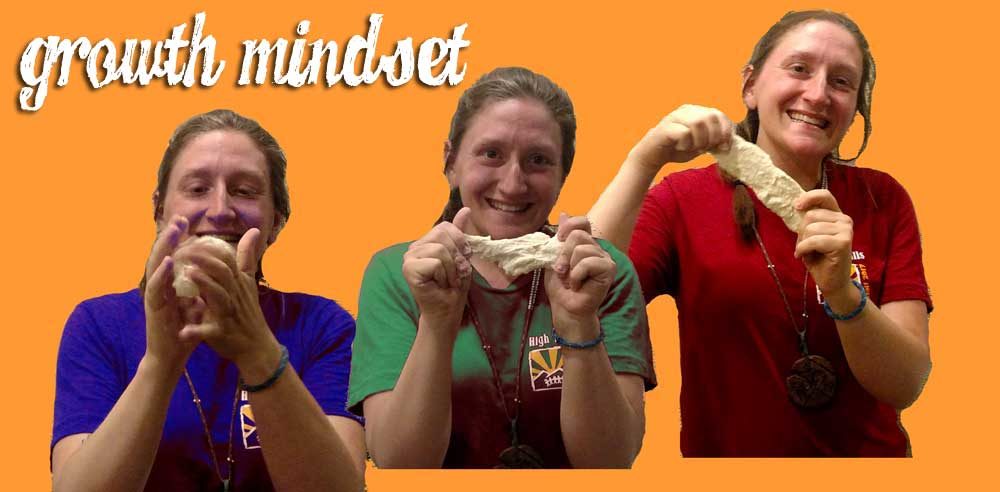
The Growth Mindset and Stretching. Yes, that is Alicia with some dough.
We all have different strengths, and we all face different challenges. We have to remember that we will all struggle with something at some stage in our lives.
But beware: what we tell ourselves when tackling those challenges will quickly become our best friend or worst enemy.
The Fixed Mindset: this is a belief that your personal qualities are innate and set in stone – you are born with a certain level of intelligence and the rest of your life is an opportunity to prove it to others.
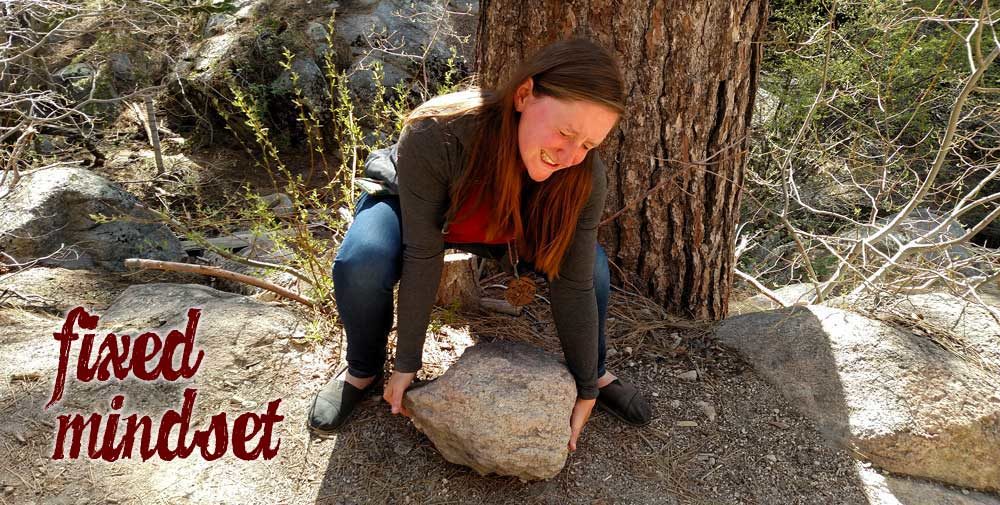
The Fixed Mindset and things set in Stone. Yes, that is Alicia with a big ol’ rock.
Challenges At High Trails
Students are given opportunities to control their mindsets during the personal and team challenges of Adventure Day – the rock climbing wall, archery range, and our low-ropes initiative course.
At some point during this day, they may step outside of their comfort zone and realize that some challenges are more difficult for them than they expected. Depending on their mindset, they either feel encouraged or dejected by the obstacles they face. This is similar to how high level artists or athletes can feel. Do artists and athletes succeed because of their natural talent or relentless hard work? Probably both, but the effort they put in, and refusal to believe their abilities are set in stone, allow them to overcome obstacles and cope with failures along the way.
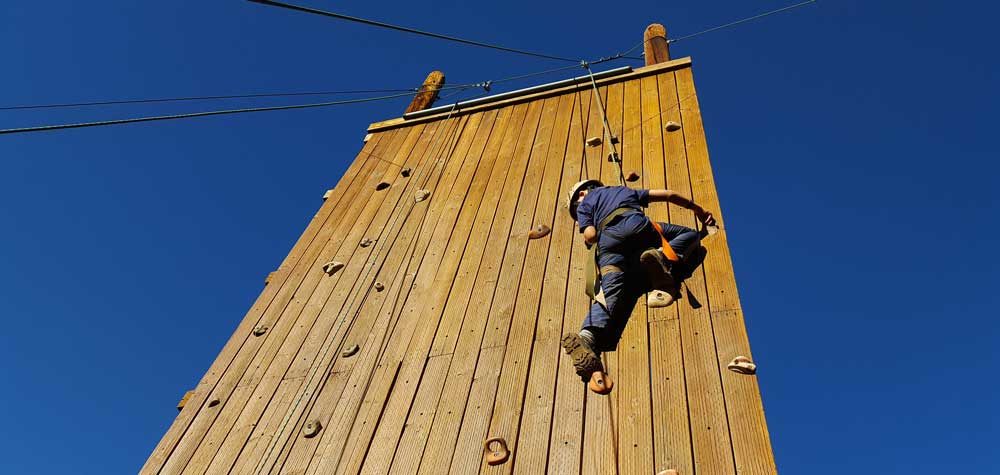 Let’s take the High Trails student climbing the rock wall. If they have a growth mindset, they value effort over talent. They recognize that with practice, skill can be developed. Their natural talent or skill does not determine their self worth. Students with this mindset will repeatedly try to climb over the challenging overhang even after repeatedly missing a hold or slipping.
Let’s take the High Trails student climbing the rock wall. If they have a growth mindset, they value effort over talent. They recognize that with practice, skill can be developed. Their natural talent or skill does not determine their self worth. Students with this mindset will repeatedly try to climb over the challenging overhang even after repeatedly missing a hold or slipping.
If the student has a fixed mindset on the rock wall, they will value natural talent over their efforts. They view their skills as fixed and effort as something only to be done when you aren’t good enough. This student will try the overhang once and immediately ask to be done when they don’t get it the first time.
 Staying with the student at the rock wall at High Trails, we’ve seen how the student’s mindset will affect their ability to push themselves. To take it one step further, how will their mindset affect their perception of failure?
Staying with the student at the rock wall at High Trails, we’ve seen how the student’s mindset will affect their ability to push themselves. To take it one step further, how will their mindset affect their perception of failure?
The student with a Fixed Mindset would only view success as winning or reaching the top of the wall; everything else is failure. Not reaching the top would feel like it was a personal attack on their abilities and natural talent which often causes them to shift the blame to external factors. In fact, in some cases, there might be a Fixed Mindset student who wouldn’t even attempt the wall, avoiding encounters that may make them look stupid.
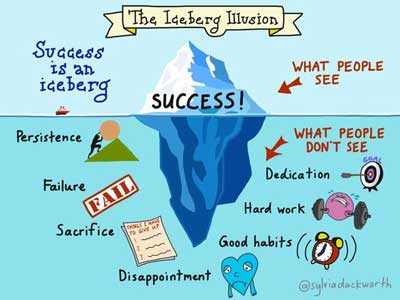 A Growth Mindset student would view success as doing their best, constantly learning and improving. They view failure as an opportunity to learn from their mistakes and use it as motivation for improving in the future. A student with this Growth Mindset would view even getting three steps up the rock wall when they are afraid of heights as success.
A Growth Mindset student would view success as doing their best, constantly learning and improving. They view failure as an opportunity to learn from their mistakes and use it as motivation for improving in the future. A student with this Growth Mindset would view even getting three steps up the rock wall when they are afraid of heights as success.
Using Growth Mindset at High Trails
At High Trails, instructors strive to not only teach the environmental and adventure curriculum but to facilitate new experiences in a whole new environment. Most students will find themselves outside of their comfort zone at least once during the week. Will they shy away or face what’s difficult? How can instructors help students develop strategies to embrace failure? How can they break free from the fear of looking stupid while stepping out of their comfort zone?
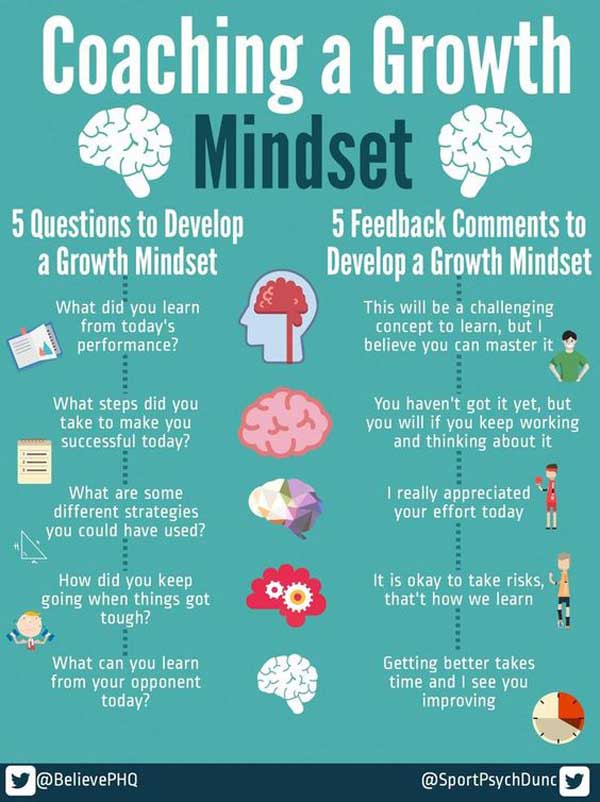 Here are some tips and tricks for Instructors:
Here are some tips and tricks for Instructors:
- Praise their efforts. Compliment hard work such as at the Climbing Wall, Hiking, Team Challenges, Archery, Trying New Food, Overcoming Homesickness.
- Define yourself by hard work instead of natural talent to the students. This allows us to set the example of not giving up easily and tackling harder challenges.
- Share personal challenges and mistakes with students.
- Focus the group on effort and the journey, not just the result.
- Vocalize acceptance of failure by your students. It is always part of the process, and it gives us something to work towards.
- Catch your students when they are vocalizing the Fixed Mindset. Give them mantras to say that promote a Growth Mindset.
In Mindset, Dweck encourages us to change the way we talk to ourselves when we face challenges. She believes that the first step to adopting a growth mindset is changing the language we use when we struggle. Every student will face different challenges during the week, ranging from the rock wall to hiking for the first time. At High Trails, instructors and students can work together to take on challenges that are outside of their comfort zone.
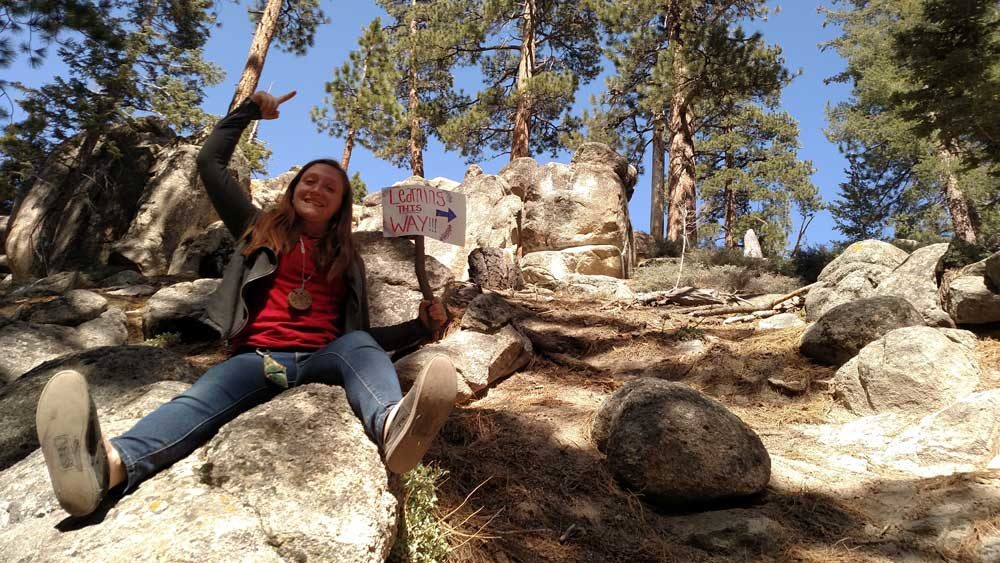
At High Trails Outdoor Science School, we literally force our instructors to write about elementary outdoor education, teaching outside, learning outside, our dirty classroom (the forest…gosh), environmental science, outdoor science, and all other tree hugging student and kid loving things that keep us engaged, passionate, driven, loving our job, digging our life, and spreading the word to anyone whose attention we can hold for long enough to actually make it through reading this entire sentence. Whew…. www.dirtyclassroom.com

Comments are closed.